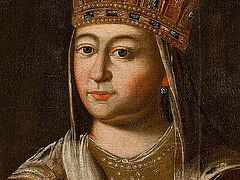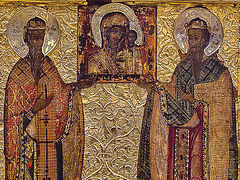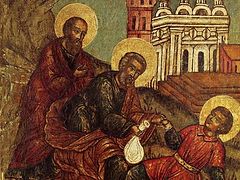Feodor Ioannovich, the Tsar of All Rus and the Great Prince of Moscow, reigned for fourteen years from 1584 until his death on January 7, 1598. That’s not a short term, but his reign somehow disappeared from the historical consciousness of our contemporaries. Meanwhile his experience of ruling the country is not without interest.
“Historical error”
 Feodor Ioannovich, the Tsar of All Rus and the Great Prince of Moscow In Soviet schools, the emphasis regarding the personality of Tsar Feodor Ioannovich was definitively placed on his “feeble-mindedness,” “a typical example of the fundamental absurdity of tsarism”; in other words, how could a mentally retarded person be installed as the head of the state?!
Feodor Ioannovich, the Tsar of All Rus and the Great Prince of Moscow In Soviet schools, the emphasis regarding the personality of Tsar Feodor Ioannovich was definitively placed on his “feeble-mindedness,” “a typical example of the fundamental absurdity of tsarism”; in other words, how could a mentally retarded person be installed as the head of the state?!
I don’t think the modern school has changed opinion about him either.
If that’s the case, why should we even start talking about him? “The historical error...” To determine the dates of his life, to mention his mental inferiority and summarize: “Most historians believe that he was incapable of being a statesman.” And so on; the history course has no time to spare on him.
Let us put aside attempts to draw a line between the concepts of mental completeness and mental disability; let’s ask a different question:
“Can a mentally retarded person be a saint?”
“Why not?”
“Can a saint have a good influence on the life of the whole nation?”
“What are you talking about?”
The scribe Ivan Timofeev, a well-known statesman of the time, wrote:
“With his prayers, my tsar protected the land from enemy intrigues. He was meek, truly merciful and innocent to all, and like Job, he guarded himself from every evil thing, loved above all piety, the splendor of the Church; and besides the holy hierarchs, he loved the monastic rank and even our lesser brothers in Christ who were honored in the Gospel by the Lord Himself. To put it simply, he gave all of himself and all of his holy and venerable reign to Christ.”
“Kept the land unharmed” is not a figure of speech. His contemporaries remembered at least one such case down to the last detail. It concerns the invasion of Moscow by Khan Kazy-Girey in 1591.
Did a hundred-thousand-man army of Tatars... get scared?
When you delve into the written accounts of the invasion, it becomes obvious: There are some odd inconsistencies in the descriptions of the Tatars’ defeat, which the authors persistently ignored.
A hundred-thousand horde of Crimean and Nogai Tatars under the leadership of Khan Kazy-Girey invaded the Russian tsardom and were quickly marching toward Moscow. The ability of such an army to march quickly isn’t disputed at all, but in this case, the Khan didn’t even allow his warriors to get distracted and capture “live goods,” or prisoners.
But thanks to the well-organized reconnaissance, as well as the sacrifice of the barrier detachment, the Russian troops had time to move up to Moscow and set up field fortifications beneath its walls (typically called “guliay-gorod”, built from supply carts, special shields and/or improvised means).
The advanced detachments of Tatars attacked the Russian fortifications, but they were unsuccessful, and by evening, they retreated to the main camp. At night, Russians sent a three-thousand-strong detachment to the camp... and the whole huge horde broke loose and fled, abandoning their supply column.
The whole huge horde broke loose and fled, abandoning their supply column! Why?
It is very tempting to say the sacramental, “I don’t believe...” Why would they run away from such a tiny detachment, compared to their great army?
Ahh, they were frightened by an attack and cannon fire! the authors claim.
Let’s be real. Are we really talking about the Tatar army right now?
For the people of that time, the phrase, “The Tatars got frightened... and fled...” was extremely meaningful. Nineteenth century schoolgirls could be frightened by a little shooting. But the Crimean and Nogai hordes breathed war and plunder—they were professional warriors. In this context, they also significantly outnumbered the adversary, so why would they have been frightened? We’re not talking about “Grad” rocket systems. Why, have they never seen the cannons of that time?
Came under fire? Well, all they had to do was assess the situation and apply appropriate tactical methods.
But getting scared and running away under such circumstances wasn’t a natural response for the Horde army. But still, it did get frightened and fled.
The Tsar prayed all day long...
Moscow was in a terrible state of confusion, almost on the verge of total turmoil during those days. At first, it was unclear whether the troops would have enough time to assemble there. Then it became clear that they weren’t numerous enough. Even though the townspeople were most likely spared hearing the attackers’ war cries, they already knew what the Tatar pogrom was like: Only twenty years ago, the country had experienced the raid of Khan Devlet Girey’s horde.
Everyone remembered what it was like then. They were also unable to gather a large army, but they learned about the invasion in advance. So, the fortifications were made and a cunning plan was developed in advance... But nothing worked—the horde bypassed the fortifications, the guards of the city (the so-called Oprichniki) were helpless, while a sudden fierce wind fanned a small fire into an absolute hell: Moscow, then a city of about one hundred thousand, was burnt to the ground in three hours (!), with an untold number of victims...
This time around, they were able to repel the first attacks of the Tatars, even inflicting considerable damage on them. But these were only the advance detachments of Kazy-Giray. The real assault was expected the following day and everyone in the capital was dreading it.
Everyone except for Feodor Ioannovich. He prayed all day, and at night he told his retinue not to worry about it—the enemies would be gone tomorrow. He said this and went to bed. There were no enemies the next day.
Well, you know, everyone did get scared...
St. Theodore and St. Demetrius
Only one event marred the reign of Feodor Ioannovich: the murder of Tsarevich Dimitry.
It is a debating point, who really gave the order to kill Tsarevich Dimitry. It doesn’t seem possible to solve it in this world. It is true though that the Tsarevich was removed from the court with the knowledge and consent of Feodor Ioannovich.
However, there was nothing malicious about it. Tsarevich, the son of his father’s seventh wife, was de facto illegitimate. Feodor Ioannovich acted exactly as a statesman; no one relieved him of his responsibility for his people, while history is replete with examples when bastard tsareviches or king’s sons gathered armies and seized states.
No one wished the tsarevich ill, but Feodor Ioannovich simply created an environment in which the tsarevich could not be considered a claimant to the throne—his name was crossed out of all litanies and commemorations. His family received a decent allowance and sent far away from Moscow.
The boy, of course, can’t be blamed for anything that had happened. The whole story of his life and death is an example of meek suffering for the sins of his parents. This boy is a saint.1
But Tsar Feodor Ioannovich is also a saint. For there is holiness that comes from innocently bearing the sufferings and then there is holiness that comes from a conscious feat of life.
“Quiet, merciful, kind, pious and truly meek”
However, special reverence is given to the consideration that in the figure of Feodor Ioannovich, not only his piety as the enthroned ruler captivates the mind, but also his apparent martyrdom in life.
Feodor was orphaned at the age of three. He was sickly all his life and died at the age of forty, growing feeble in health. It is even hard to imagine what this pure and merciful soul had to experience in the atmosphere of the reign of Ivan the Terrible.
He suffered from mental weakness since childhood. He suffered from mockery and reproaches because of it. He suffered in general from his tyrannical father, especially when he tried to separate him from the only person he had ever known—his wife, a holy woman, by the way.
He suffered when the clergy whom he has so revered and loved had demanded the same!
He suffered because they had no children. When his long-awaited daughter was born, he suffered when he buried her a year and a half later.
Suffering, suffering...
What do we read in reviews by his contemporaries?
-
“He is quiet and merciful,”
-
“Very kind, pious and truly meek,”
-
“reigned… peacefully and righteously, and mercifully, blissfully,”
-
“meek, merciful to all.”
How much pain did this God-loving soul have to endure—shifting no responsibility, NONE, to other shoulders. All we hear is: merciful, merciful, kind, meek, welcoming…
My Lord, can it ever be like that?!
Yes, it can… But how condemning it sounds inside the heart! After you’ve read about a life like his, you can’t bring yourself to judge anyone…



